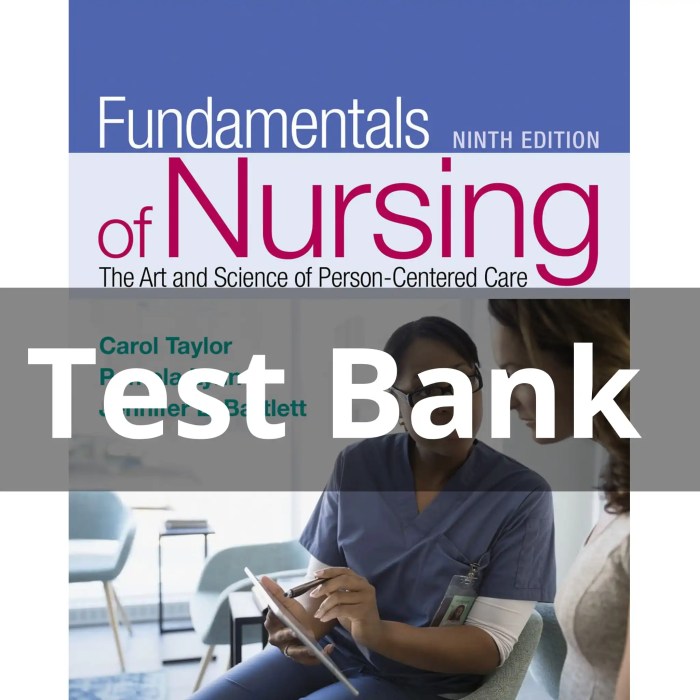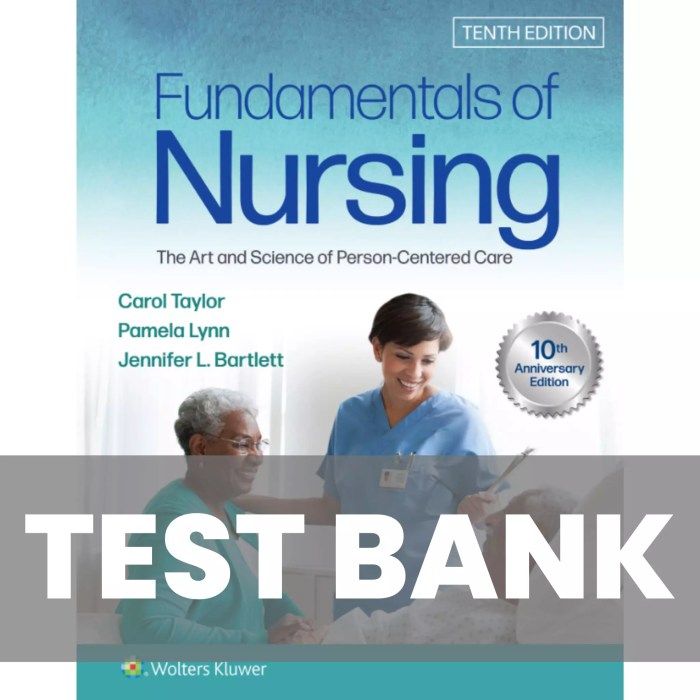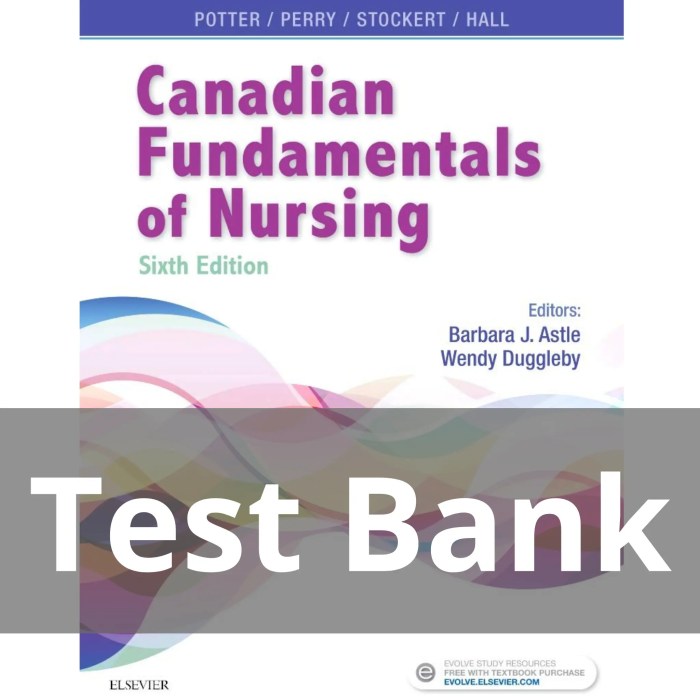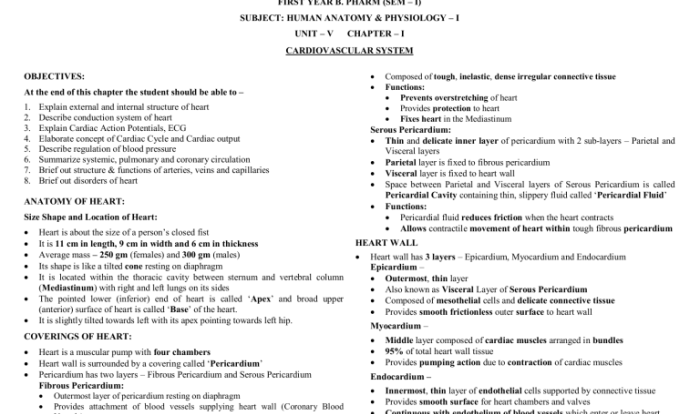Welcome to the definitive guide to nursing fundamentals, empowered by the invaluable Fundamentals of Nursing Test Bank Taylor. This comprehensive resource delves into the core principles and practices of nursing, equipping you with the knowledge and skills to excel in your nursing career.
Throughout this guide, we will explore the essential concepts of nursing fundamentals, unravel the intricacies of nursing assessment, and delve into the art of developing and implementing individualized care plans. We will also shed light on the significance of ongoing evaluation in nursing practice, ensuring that you are equipped with the tools to deliver exceptional patient care.
Nursing Fundamentals
Nursing fundamentals are the foundational principles and concepts that guide nursing practice. They encompass a comprehensive understanding of the nursing process, patient care, and the role of nurses in promoting patient safety and well-being.
Key concepts include the nursing process, which involves assessment, diagnosis, planning, implementation, and evaluation; patient-centered care, which emphasizes the individual needs and preferences of the patient; and evidence-based practice, which utilizes research findings to inform nursing interventions.
Nursing interventions related to basic patient care include activities such as monitoring vital signs, providing hygiene and comfort measures, administering medications, and assisting with activities of daily living.
Role of Nurses in Promoting Patient Safety and Well-being, Fundamentals of nursing test bank taylor
- Assess and monitor patients for potential risks and complications.
- Educate patients and families about health conditions and treatments.
- Advocate for patients’ rights and preferences.
- Collaborate with other healthcare professionals to provide comprehensive care.
Nursing Assessment
Nursing assessment is the systematic collection and analysis of data about a patient’s health status. It involves gathering information from various sources, including the patient, family members, and medical records.
Steps involved in conducting a comprehensive nursing assessment include:
- Reviewing the patient’s medical history and current health status.
- Conducting a physical examination, including vital signs, skin assessment, and neurological assessment.
- Interviewing the patient and family members to gather subjective data about symptoms, concerns, and coping mechanisms.
Types of Assessment Techniques Used in Nursing
- Interviewing
- Physical examination
- Observation
- Medical record review
Importance of Accurate and Thorough Documentation in Nursing Assessment
- Provides a baseline for future assessments and comparisons.
- Facilitates communication among healthcare professionals.
- Supports legal and ethical obligations of nurses.
Nursing Care Planning

Nursing care planning is a systematic process of identifying, prioritizing, and planning interventions to meet the individual needs of a patient.
Steps involved in developing a nursing care plan include:
- Assessing the patient’s health status and identifying problems.
- Establishing nursing diagnoses based on the identified problems.
- Developing goals and outcomes for each nursing diagnosis.
- Planning interventions to achieve the desired outcomes.
Examples of Nursing Diagnoses and Interventions for Common Patient Conditions
| Nursing Diagnosis | Interventions |
|---|---|
| Risk for Impaired Skin Integrity | – Monitor skin integrity and implement preventive measures.- Provide pressure-relieving devices.- Educate the patient on skin care techniques. |
| Pain | – Assess the patient’s pain level and characteristics.- Administer pain medication as prescribed.- Implement non-pharmacological pain management techniques, such as heat or cold therapy. |
Importance of Individualized Care Planning in Nursing
- Tailors care to the specific needs of each patient.
- Promotes patient involvement in their own care.
- Improves patient outcomes and satisfaction.
Nursing Implementation

Nursing implementation is the process of carrying out the planned nursing interventions. It involves providing direct patient care and monitoring the patient’s response to the interventions.
Different methods of nursing implementation include:
- Direct care
- Indirect care
- Collaboration
Examples of Nursing Interventions for Various Patient Care Situations
| Patient Care Situation | Nursing Interventions |
|---|---|
| Postoperative care | – Monitor vital signs and surgical site.- Administer pain medication as prescribed.- Encourage early ambulation. |
| Diabetes management | – Educate the patient on diabetes management.- Monitor blood glucose levels.- Administer insulin as prescribed. |
Importance of Evaluating the Effectiveness of Nursing Interventions
- Ensures that the interventions are achieving the desired outcomes.
- Provides feedback for modifying the care plan as needed.
- Promotes evidence-based practice and quality improvement.
Nursing Evaluation: Fundamentals Of Nursing Test Bank Taylor

Nursing evaluation is the process of assessing the effectiveness of nursing interventions and the overall quality of care provided.
Different types of nursing evaluations include:
- Outcome evaluation
- Process evaluation
- Patient satisfaction evaluation
Examples of Evaluation Criteria Used in Nursing
| Evaluation Criteria | Description |
|---|---|
| Patient satisfaction | The patient’s perception of the care received. |
| Pain level | The patient’s subjective assessment of pain intensity. |
| Wound healing | The progression of wound healing over time. |
Importance of Ongoing Evaluation in Nursing Practice
- Provides feedback for improving the quality of care.
- Identifies areas for further research and development.
- Promotes accountability and professional growth.
Question Bank
What is the significance of nursing fundamentals?
Nursing fundamentals provide the cornerstone for all nursing practice, establishing the essential knowledge and skills required to deliver safe and effective patient care.
How does Taylor’s Test Bank contribute to nursing education?
Taylor’s Test Bank offers a comprehensive collection of practice questions and answers, enabling nursing students to reinforce their understanding of fundamental nursing concepts and prepare for exams.
What are the key components of a nursing care plan?
A nursing care plan typically includes a nursing diagnosis, desired outcomes, nursing interventions, and an evaluation component, ensuring individualized and goal-directed patient care.
